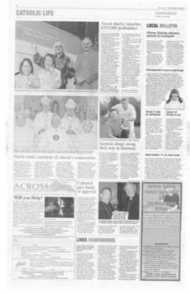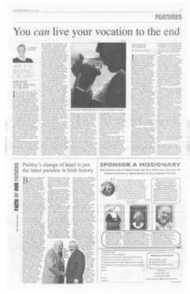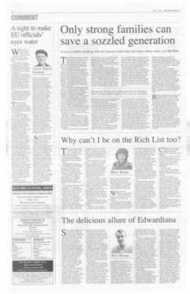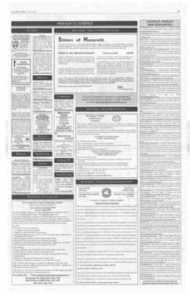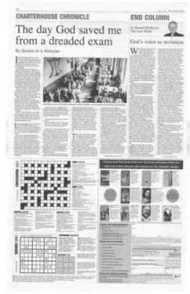Page 5, 4th May 2007
Page 5
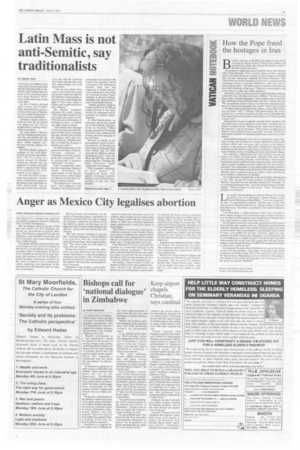
Report an error
Noticed an error on this page?If you've noticed an error in this article please click here to report it.
Tags
Share
Related articles
Speculation Mounts Over 'universal Indult' To...
Lefebvrists Snub Pope's Call For Unity
Tridentine Young People Invited To World Youth Day
Pope Proclaims The Glory Of The Eucharist
Sspx Accuses The Pope Of Being An 'anti-semite'
Latin Mass is not anti-Semitic, say traditionalists
BY FREDDY GRAY
TRADMONAUST Catholics have vigorously rejected suggestions that the Tridentine Rite is antiSemitic after leading inter-religious voices expressed alarm over Pope Benedict XVI's move to lift restrictions on the Latin Mass.
As The Catholic Herald went to press, the Pontiff's hotly anticipated motu proprio, which conservative Catholics say will "set the Old Rite free", had not yet been published.
Liturgical experts believe, however, that the document will appear any day soon, a prospect that is causing considerable excitement.
Yet many liberal Catholics and inter-religious experts have said they are anxious that the impending revival of the Old Mass could reignite antiSemitic feeling among the faithful.
But John Medlin, generalmanager of the Latin Mass Society in England and Wales; said: "This is a storm in a teacup created by liberals within the Church who are desperate to mount a last-ditch effort to stop the Holy Father from publishing the morn proprio, in my opinion."
Several interfaith groups expressed particular concern about a Good Friday prayer in the missal of the Latin Mass of 1962, which reads: "Let us pray also for the Jews, that the Lord may take the veil from their hearts and that they may also acknowledge our Lord Jesus Christ.
"You do not refuse Your mercy even to the Jews; hear the prayers which we offer for the blindness of that people so that they may acknowledge the light of Your truth, which is Christ, and be delivered from their darkness."
Mr Medlin staunchly defended the words, saying: "The Latin Mass Society does not regard any prayer in the 1962 missal as demeaning or insulting to Jews, or indeed any other religious group.
"All Catholics have the right to insist that they have the fullness of faith and it is proper that they should wish to share this fullness with other religious believers. Whether they take on board the message is entirely up to them."
Yet Edward Kessler of the centre for the Study of JewishChristian relations of Cambridge University said his group was "concerned". "Are we getting back to negative stereotypes?" he asked.
Some commentators claim that the impending liturgical reform undermines the achievements of the Second Vatican Council, which called on Catholics to hold other religions in greater esteem.
"The references to 'even the Jews', `their darkness', and `blindness' and [calls] for their conversion runs counter to the respect for ongoing Jewish covenantal life throughout historic time that was expressed in Nostra Aerate," said a statement by the Centre for Christian-Jewish Understanding at Boston College, referring to the Vatican II document on interfaith relatons.
"Similar problems might be found elsewhere in the Missal simply because it was =informed by subsequent developments in Catholic understanding."
Fr John Pawlikowski, an American servite and expert on Jewish-Catholic dialogue, wrote to Cardinal Walter Kasper. president of Promoting Christian Unity, setting out his worries about the language of the Old Mass.
Writing on behalf of the International Council of Christians and Jews, Fr Pawlikowski argued that even though Pope John XXIII had in 1962 removed the offensive phrase "perfidious Jews" from the Mass, the Old Rite still used prayers that Jews, Muslims and other Christians found "profoundly demeaning."
"The expanded validation of such prayers," Fr Pawlikowski wrote, "will rightly challenge Catholic integrity in terms of the proclamations of the last four decades."
Editorial Comment: Page 11
blog comments powered by Disqus







